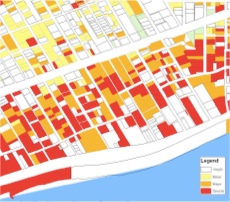 Good data, more data, more accurate data; these are not sufficient to solve our world’s social and environmental problems. With these data, we can map the polygons of poverty like we map political preferences or climate change, but they are not sufficient to explain the social mechanisms that create and maintain poverty. Without understanding and changing the social mechanisms of reward and punishment that perpetuate poverty, we won’t reduce or eliminate the vast disparity of wealth that thrusts pain and stress upon so very many people. We might “clean up” one or two areas mapped by poverty polygons, but really, we are simply moving more affluent people in and pushing the least powerful out.
Good data, more data, more accurate data; these are not sufficient to solve our world’s social and environmental problems. With these data, we can map the polygons of poverty like we map political preferences or climate change, but they are not sufficient to explain the social mechanisms that create and maintain poverty. Without understanding and changing the social mechanisms of reward and punishment that perpetuate poverty, we won’t reduce or eliminate the vast disparity of wealth that thrusts pain and stress upon so very many people. We might “clean up” one or two areas mapped by poverty polygons, but really, we are simply moving more affluent people in and pushing the least powerful out.
 Good data, more data, more accurate data; these are not sufficient to solve our world’s social and environmental problems. With these data, we can map the polygons of poverty like we map political preferences or climate change, but they are not sufficient to explain the social mechanisms that create and maintain poverty. Without understanding and changing the social mechanisms of reward and punishment that perpetuate poverty, we won’t reduce or eliminate the vast disparity of wealth that thrusts pain and stress upon so very many people. We might “clean up” one or two areas mapped by poverty polygons, but really, we are simply moving more affluent people in and pushing the least powerful out.
Good data, more data, more accurate data; these are not sufficient to solve our world’s social and environmental problems. With these data, we can map the polygons of poverty like we map political preferences or climate change, but they are not sufficient to explain the social mechanisms that create and maintain poverty. Without understanding and changing the social mechanisms of reward and punishment that perpetuate poverty, we won’t reduce or eliminate the vast disparity of wealth that thrusts pain and stress upon so very many people. We might “clean up” one or two areas mapped by poverty polygons, but really, we are simply moving more affluent people in and pushing the least powerful out.
Social Mechanisms
What are these social mechanisms? They are implicit principles that guide the invisible, social machines we have created to organize ourselves for working, for living, for creating and distributing our collective economy. Like Frankenstein’s visible monster, our invisible social machines seem beyond our individual control. We might stop or control a few of these machines, these corporate enterprises by which we organize our economic functions, but the underlying principles, the social mechanisms, just create more corporations that behave in the same way—rewarding greed and persecuting reform—rewarding short-term profit-taking over long term wealth-building.
What underlying values do our social mechanisms incorporate? Simply, a lust for power and profit. We have built social machines that replicate our individual need to control more, and our insatiable hunger to acquire more and more. Just as we have built automobiles and airplanes to amplify our need to travel, and we have built cell phones and the Internet to amplify our need to communicate, so have we created corporations to amplify our need to acquire and control.
How is it that individually and collectively we have emphasized our social intercourse for just two qualities – acquisition and control? Perhaps because individually and collectively we haven’t yet learned their limitations. Truly, we do need to acquire a certain amount of material wealth in order to live with a reasonable amount of control and comfort. But, we haven’t clearly determined how much is “reasonable,” how much is enough! For nearly everyone, “enough” would be about 15% more than we currently have. No matter what we currently have! And yet, eventually we must learn that power and control alone do not bring happiness. Alone, they do not leave us with a lasting feeling of satisfaction, a feeling of meaning and fulfillment in our lives. And still, we work ever harder, strengthening our social machines ever more strongly, to acquire even more power and profit.
Power and profit are “zero-sum” quantities; one person’s gain is recognizable only in contrast to another’s loss. We say “it’s a dog-eat-dog world,” meaning “if we don’t eat someone else’s dog, their dog will eat ours.” And at the end of the day, or the end of our lives, we will have eaten others and been eaten by others, and still, with all of our stuff, we still feel hungry, and frightened, resentful and … empty.
Individual Fulfillment
Often, we have heard the wisdom that other qualities are equally important for a fulfilled and fulfilling life: love, connection, awe, and repair. Individually, we try to cultivate these qualities within our families and among our close friends. But collectively, our social machines, our corporate organizations, are not built to recognize nor reward these qualities. And so they don’t … to our peril … because our social machines actually work against those life-filling qualities. Our modern society sucks up our time to live and enjoy each other; it withholds status and acknowledgement from those who seek to love, who listen to connect, who feel the awe of being alive, and who work to repair what is broken in our community and our environment, and within ourselves.
We could design our social machines to recognize, reward, and nurture those qualities, along with acquisition and control. Our states’ laws charter corporations into existence. And even though the current “Citizens United” decision of our Supreme Court posits that corporations have the same rights as people, we could enact laws to control and modify their behavior. We could institute a rechartering procedure, say every 25 years. In that procedure, a corporation’s record would be examined not just for its financial achievement, but also for its environmental impact, for the way it has treated its employees, for the way it has treated its customers, and for its general impact on our society. Those corporations that were deemed to be environmentally unsustainable, coercive, unhealthy or socially destructive would be unchartered and disbanded.
Collective Action
A fantasy? Seemingly. The enormity and complexity of the task of disbanding corporations seems “unrealistic.” But that is because we have constructed social machines that don’t have an “off” switch or an “escape” key. Without those, they run amok, uncontrolled, enabling a few to acquire wealth enormously while most people struggle to survive, and those in between live with unhealthy stress. Our social machines are destroying individual lives and families, and despoiling our life-sustaining environment without any consequence to themselves. Indeed, their owners are richly rewarded, which is the whole idea of corporate enterprise. Yet even the CEOs and stockholders are unable to change these social machines alone.
Collectively, within our legal framework, such a change is theoretically possible. An initial step is to recognize and call attention to the social mechanisms – our collective values of what is important – that formulate corporate enterprises. When we begin seeing and talking about the implicit values that motivate corporate behavior, we can begin to change those behaviors which cause and perpetuate the extremes of wealth and poverty we are able to display so precisely on a map.
Interesting Links:
Renewing Corporate Charters
Revisiting Corporate Charters – Center for Corporate Policy
The Social Responsibility Amendment
What to do about Corporations?
Reversing Citizens United
How a clerical error made corporations people
Supreme Court considers vast increase in the political power of corporations
Citizens Must Unite to End Citizens United
Sign the Petition: https://movetoamend.org/
Program on Corporations, Law & Democracy
A Call to Restore Public Control
Fight Citizens United with Fair Elections
Fed Up with Runaway Campaign Spending, Voters Back Amendment to Overturn Citizens United